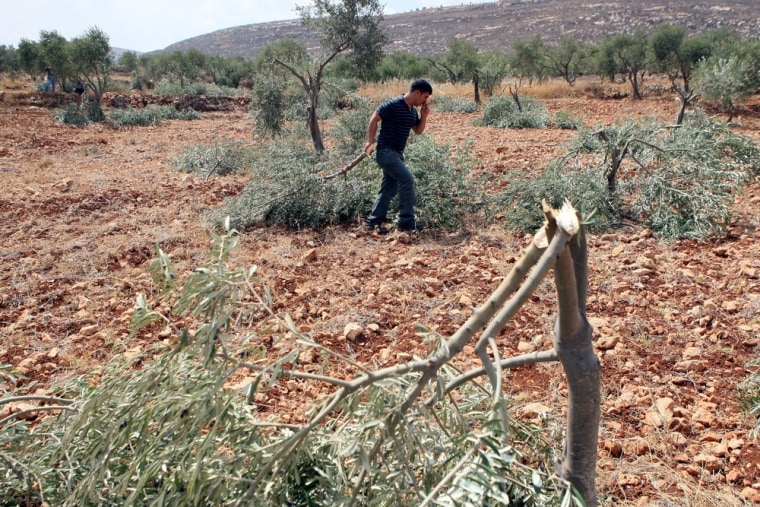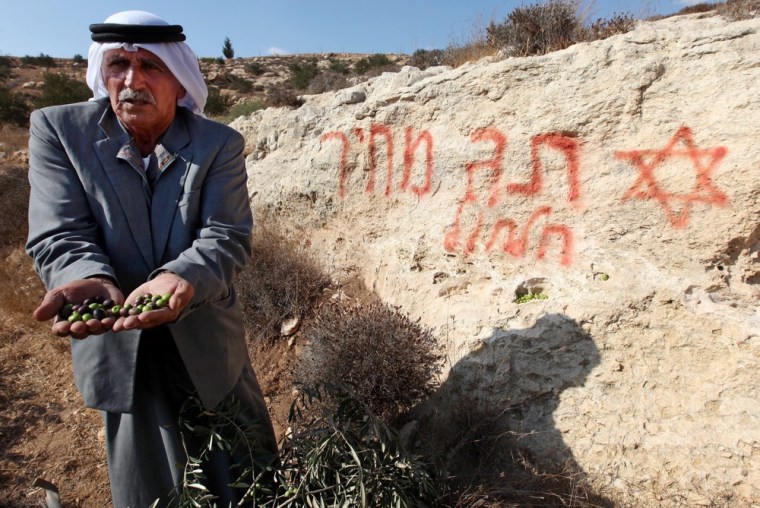They strike in the dead of night, setting fire to mosques and daubing their walls with "Price Tag" graffiti, the defiant slogan of Israeli settlers waging a vigilante campaign branded as "un-Jewish" by President Shimon Peres.
The "price-taggers" have vowed to avenge any move by Israeli authorities to uproot settlement outposts built in the occupied West Bank without Israeli government permission.
Dozens of those outposts, which Israel has repeatedly promised its main ally, the United States, to remove, remain on lonely West Bank hilltops on land to which many settlers claim a Biblical right and where Palestinians want to build a state.
On some of the few occasions when Israeli army bulldozers have torn down structures at the outposts, Palestinian villagers have awoken the next morning to find a local mosque charred by fire and with the now-familiar graffiti on its walls.
Israeli leaders have condemned the incidents. But no one has been charged in the three arson attacks in the West Bank over the past year, an indication, Palestinians say, of indifference by a right-wing government that includes pro-settler parties.
Now the "Price Tag" campaign has widened to include vandalism at an Israeli army base in the West Bank and the torching of two mosques, one this week in a Bedouin village inside Israel, touching a nerve among the country's leaders and the public.
At stake is the delicate fabric of co-existence between Israel's Jewish majority and its Arab minority, which makes up some 20 percent of the population.
"Israel had better know that it will pay for this," said a resident of Tuba-Zangariya in the Galilee, where a mosque was burned on Monday, prompting dozens of Israeli Arabs to take to the streets and hurl rocks at police, who responded with tear gas.
Response to attack?
Graffiti left at al-Nur mosque suggested the "price-taggers" were responding to the deaths of a settler father and baby killed last month when their car overturned in the West Bank after Palestinians threw rocks at it.
Police said they had set up a special task force to deal with the "price taggers" and announced on Thursday that they had arrested a suspect in the Tuba-Zangariya case.
In another potential breakthrough against the militants, three settlers were charged in a court in Jerusalem on Wednesday with planning to set fire to a West Bank mosque.
In addition to assaults on mosques, militant settlers have been blamed for a string of car burnings and the uprooting of hundreds of olive trees and grapevines on Palestinian property.

Some Israeli human rights activists link an increase in such incidents in recent months to tensions over a Palestinian application for statehood at the United Nations, which is strongly opposed by Israel and its U.S. ally.
The "Price Tag" campaign is widely believed to be the work of a clandestine group of young settlers in unauthorized outposts where journalists are not welcome.
Security officials say such close-knit groups are tough to infiltrate, making it difficult to prevent mosque attacks or find out who carried them out.
But Avraham Dichter, a former chief of Israel's internal security agency, the Shin Bet, told Reuters the time had come to move against militant settlers, whom he described as "miserable people with a terrorist mindset."
'Harmed and kicked' population
Dichter said that while not as lethal as a Jewish group that killed three Palestinians and wounded dozens in a series of attacks in the 1980s, the recent incidents were still alarming.
Attacks on particularly sensitive places, such as the Jerusalem holy site that Jews call Temple Mount and Muslims revere as Haram al-Sharif (Noble Sanctuary), could swiftly trigger a new wave of Palestinian violence, he said.
"You can find yourself in no time in the middle of an Intifada, not because there were fatalities but just because a very important and sensitive target was hit," Dichter said.
Itamar Ben Gvir, a settler leader in Kiryat Arba, one of the most hardline Jewish settlements, told Reuters the attack on the Galilee mosque should have come as no surprise.
"The writing was on the wall, because a population that feels that they are being abandoned, harmed and kicked over and over again, it is only natural that individuals from within that population will come out and commit incidents," he said, in apparent reference to moves against unauthorized outposts.
The Galilee arson attack was swiftly condemned by Israeli Prime Minister Benjamin Netanyahu. Peres rushed to inspect the mosque, where residents were weeping over charred holy books.
"Un-Jewish, illegal, immoral and (it) brings heavy shame upon us," Peres, a Nobel peace prize laureate, said.
Peres's visit was a sign of Israeli concern that any future torching of mosques inside Israel could inflame its Arab citizens, who have long complained of discrimination.
'Biggest damage to our future'
Many Israelis are worried about more violence as Israeli Arabs mark the anniversary this month of the killings of 13 young protesters by Israeli police in October 2000 when a Palestinian uprising was raging in the West Bank and Gaza.
Mainstream settler leaders have also voiced concern at the militants within their ranks, fearing their actions will tarnish the movement whose settlements on land Israel captured in a 1967 war are deemed illegal in international law.
"Price tagging represents the biggest damage to our future. It is immoral. It is un-Jewish. I couldn't use harsher words," said Naftali Bennett, head of the Yesha (settler) Council.
"We are talking about a few hundred people living mainly in the northeastern area. I urge the police to arrest these guys and throw them in jail," he told a group of foreign reporters.
But Menachem Landow, a former officer in a Shin Bet division that investigates threats posed by Jewish extremists, said the settler leadership should do more to rein in the radicals.
"One of the things that bothers me is that the leaders of the settlements are constantly condemning (the attacks). The condemnation is not enough -- they need to cooperate with the security services, help them, because without the help from the surroundings no intelligence source has a chance," Landow said.
